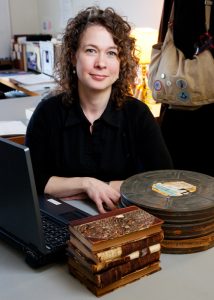
Jennifer Hain Teper, Bud Velde Preservation Librarian, Professor and Head of Preservation Services at the University Library at the University of Illinois at Urbana-Champaign, is the lead on a project sponsored by an Institute of Museum & Library Studies (IMLS) grant to develop a software program to assess preservation needs in libraries, archives, and museums.
The software in development is called the Preservation Self-Assessment Program, or PSAP, and it is a free, browser-based software that allows librarians and archivists to identify preservation needs and timelines for individual materials based upon a series of questions. A recent feature by the IMLS outlines the success of the PSAP through its wide-reaching benefits and approachable format. The ultimate goal is to provide the best possible preservation techniques for libraries and museums across the country.
The project has developed through a series of three grants, the first awarded in 2006 to develop what became the AvSAP, focusing solely on audiovisual content. A second grant awarded in 2012 allowed the program to expand past just one type of content.
A third grant that Teper expects more details on this fall will help to extend the PSAP’s influence farther beyond the original scale of libraries and archival material, including other more unique collections. Teper says, “We are looking to create a single assessment tool that will hopefully work in most mixed collections in libraries, archives, historical societies, and museums.”
The Spurlock Museum of World Cultures will be more involved as the PSAP continues to be developed, as they see the program as something that can particularly benefit their collections, which includes unique materials beyond those traditionally found in libraries and archives. Spurlock hopes to “extend the tool to provide support for preserving organic materials, including bone, feathers, leather, shell, and teeth.”
For Teper, the scope of the PSAP and its value for teaching and learning make the project especially important. Teper says, “What’s most rewarding…is knowing that we’ve created something that has been truly helpful and educational to those who are concerned about preservation of our cultural heritage but lack the knowledge to be able to make judgements on their own. We have gotten feedback that the PSAP has been really helpful to them, and that feels really great.”

